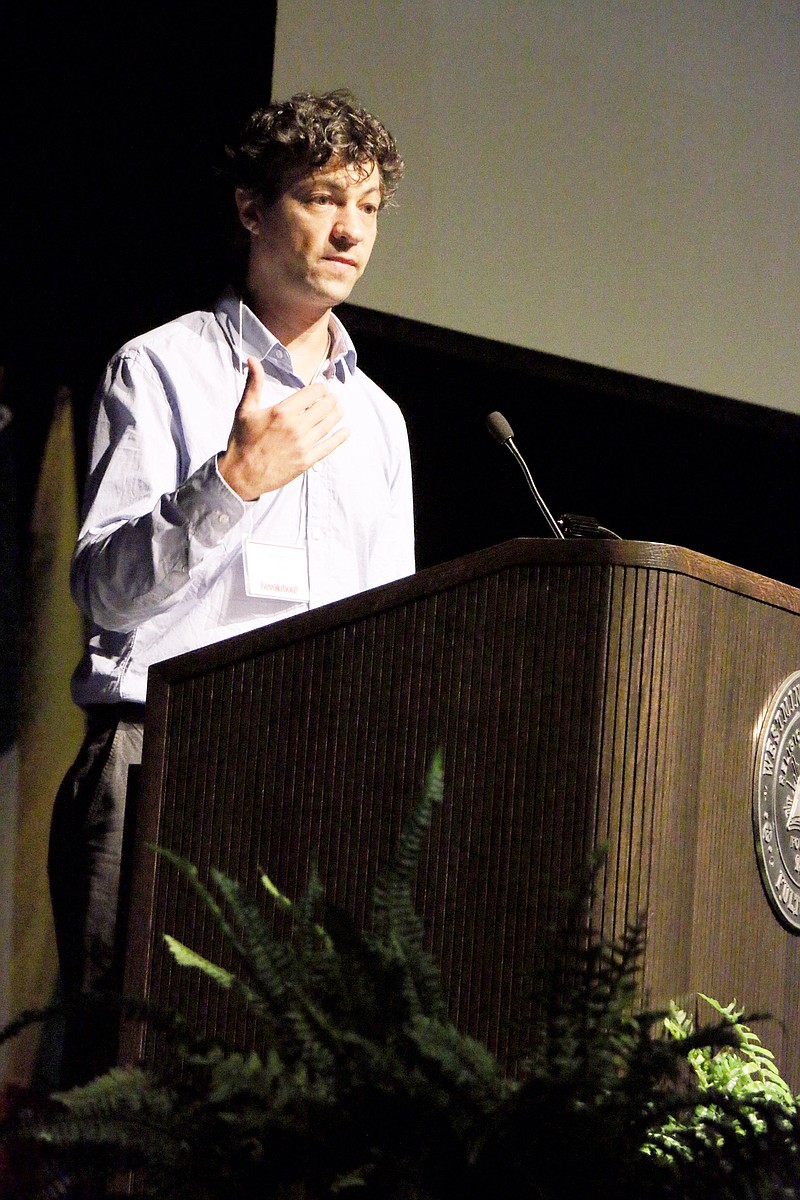Andy Paris, an actor and writer with the theater company that produced "The Laramie Project," said the play asks questions about American culture.
"I think if you read "The Laramie Project,' it does center around homophobia but it also transcends it to asking questions about how we deal with differences in our culture," Paris said.
Paris spoke Tuesday at Westminster College's 2014 Hancock Symposium. He and other members of Tectonic Theater wrote the play and screenplay of "The Laramie Project," which tells the story of Matthew Shepard, a University of Wyoming gay student who was murdered in 1998. The play tells the story of his murder and shares reactions from the town of Laramie, Wyoming, where Shepard was murdered.
Moisés Kaufman and Jeffrey LaHoste founded Tectonic Theater Project in 1991. After the 1998 murder, Paris and others from Tectonic went to Laramie. They interviewed residents in the town and developed characters from the people they interviewed. The play "The Laramie Project" was performed across the country. After the play had been out for a while, Tectonic held five performances at the University of Wyoming. Paris described those performances as especially powerful.
"Those performances were something I'd never experienced before and something I haven't experienced since," Paris said. "Being in a room with the people who went through what they went through and reinterpreting their words back to them - our characters that we are playing are in the audience, they're watching. ... They are listening for what we included and what we didn't include."
As the audience listened to the performance, Paris said the performers listened for the audience's reactions. The audience listened for how the actors were interpreting them through the characters.
"There was this very ultra powerful listening happening from the word go to the very last breath and it was intense," Paris said. "I can't say that it was fun, but it was extremely powerful for everybody to process the story together."
Tectonic Theater approached the creation of "The Laramie Project" differently than the traditional theater process. Paris explained where the theater company's model for creating plays came from. He said that he often asks students and others to tell him about a performance they've seen that stood out to them. Usually, they describe physical aspects of the performance.
"They'll describe the lights, the blood coming out, the laughter ,the beautiful voice, but they don't normally say it was the words. They don't quote me a line," Paris said. "Ninety-nine percent of the time it's all the other stuff. Yet in American theater, our traditional way of making theater is writing the text first. That's been confusing to us at Tectonic Theater Project."
In traditional theater, Paris said everything works towards illustrating the text.
"The text is ruling us and not allowing us to do what we want to do. We always have to serve the text," Paris said.
That in mind, some theater companies have moved to a different model that puts lights, costumes, set, text and everything else that goes into a performance all on an equal level. All elements of a performance can stand alone. That is the model that Tectonic Theater uses. Instead of starting with the narrative first, the elements of theater can create and affect the narrative.
Tectonic, Paris said, means the art of science and structure. Tectonic Theater focuses on how they construct a play's narrative.
"When we enter a rehearsal room we do not bring a script already written but rather themes, ideas - some text perhaps along with props and some scenic elements in order to search for new forms that resonate with us and heighten and/or complicate our content," Paris said.
For Tectonic, the script comes at the end of the process.
Paris spoke about the relationship between form and content.
"What good is a message that no one understands?" He asked the audience.
Paris started as mainly an actor, but now, he mainly writes, directs and teaches. When acting, he said his interest and passion for the plays lessened the more he performed them. He always enjoyed the beginning part of the acting process and rehearsals.
"It's more of a challenge for me to keep recreating that performance than it is for me to puzzle it out - I could do that forever," Paris said. "I love that process of putting it together."
Megan Favignano can be reached at (573) 826-2417 or [email protected].

